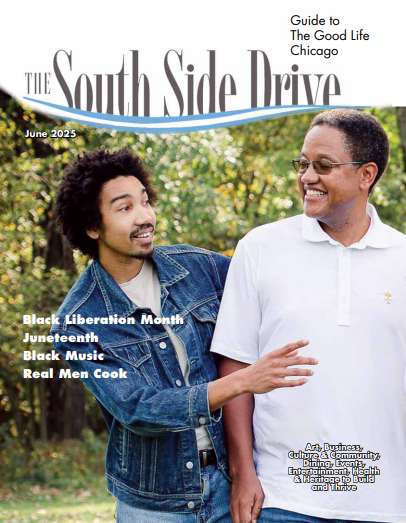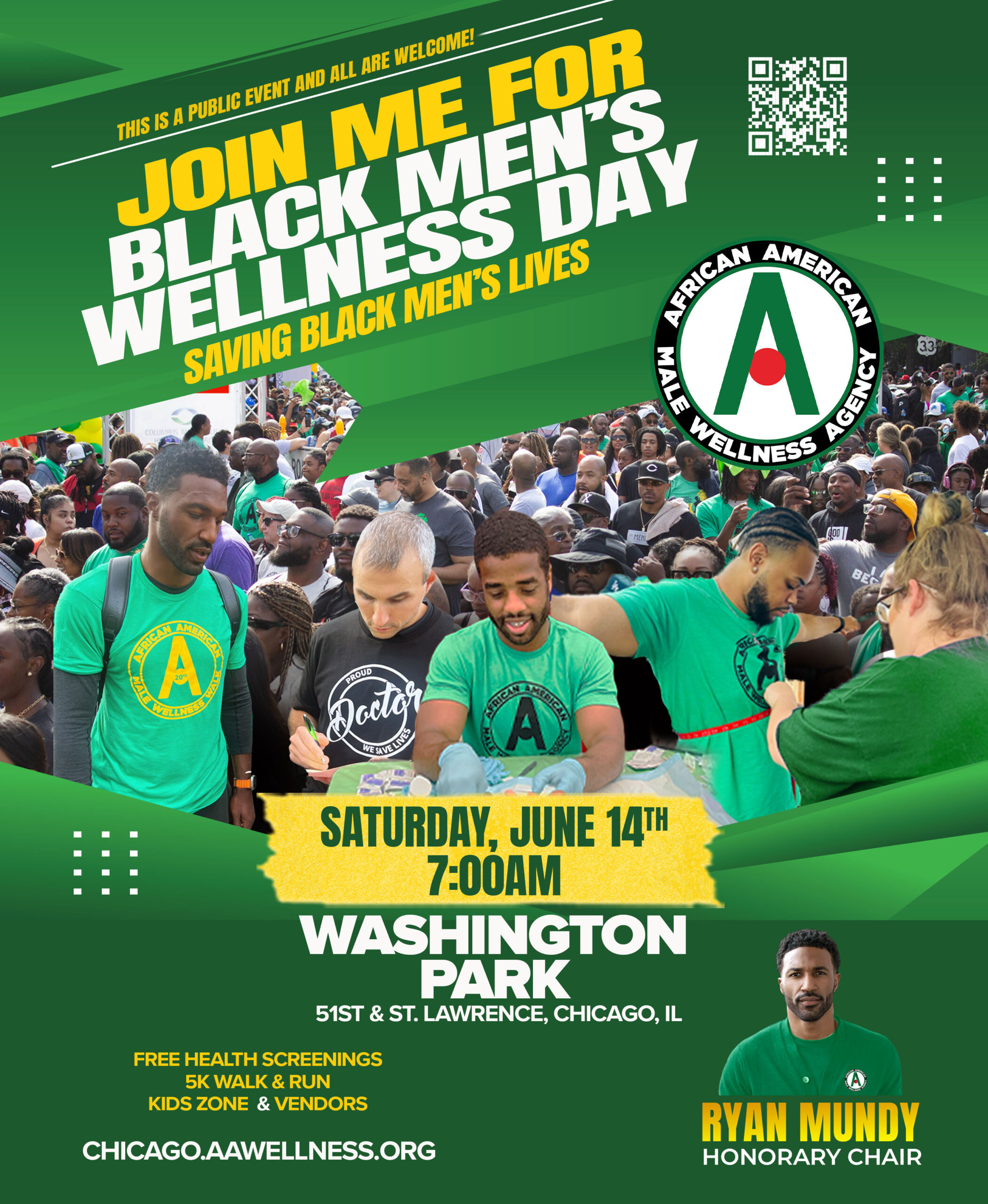The Second in our Wisdom of the Elders series was Salim Muwakkil. Salim is known well-known for the wisdom he imparts every Saturday evening on the Salim Muwakkil Radio Show which airs on WVON AM at 7 pm. Noted as being “deeper than Lake Michigan” he has fans throughout the world yes, the world. One weekly listener calls in faithfully from North Carolina, another from Canada. He’s learned of fans who listen in every Saturday from Nigeria. And just recently, a brother noted Muwakkil’s huge fan base in Puerto Rico.
Salim is also a senior editor of In These Times Magazine. Recently In These Times Magazine held its 47th Anniversary in a beautiful Haymarket-acquired mansion. Although the featured speaker was Stacey Davis-Gates, President of the Chicago Teachers Union, the surprise guest speaker was Mayor Brandon Johnson. When Mayor Johnson began to speak the first words out of his mouth were: “Salim Muwakkil.” The mayor credited Muwakkil as the person who inspired him to become an activist. He’s not the only one. Former students of Salim’s (yes, he taught, we’ll talk about that later) still contact him thanking him for the wisdom and guidance he gifted them with. Salim Muwakkil is a Vietnam-era Air Force veteran who later graduated from Rutgers University, became a Black Panther, then a Black Muslim, and wrote for the Associated Press and Muhammad Speaks, which he also edited. He became the second Black columnist (Vernon Jarrett was the first) ever to have columns in both the Chicago Sun-Times and the Chicago Tribune and he did all of this while holding down a twenty-plus-year stint as the senior editor of the left leaning publication, In These Times. That’s a lot, but there’s more. Muwakkil did a lot of freelancing as well, including pieces in the New York Times, Washington Post, New York Newsday, The Black Scholar, the Progressive, the Chicago Reader, Cineaste Magazine, the Baltimore Sun, the Toronto Star, Success Magazine, Vanity Fair and on and on.
Of course, he has a lot of wisdom to share, and share he did. He was an adjunct professor at Columbia College, the Art Institute of Chicago, Associated Colleges of the Midwest, and the University of Illinois.
This is only a small part of Muwakkil’s extensive curriculum vitae, which describes a journalist with a wide range of interests and a fascinating political compass. Inside stories about membership in iconically dissident groups like the Panthers and the NOI provided illuminating glimpses into the passions that fueled the rebellious spirit of those times and kept the audience at the Quarry Event Center fascinated and full of questions. After his radical past, Muwakkil’s later appearances on the pages of mainstream publications offered hints on how certain journalistic gaps can be bridged.
The audience, consisting of history buffs, connoisseurs of the Black Movement, and weekly listeners who wanted to see and meet and talk to this great man, found his insider accounts of militant groups and activist journalism compelling to say the least. His presentation was vividly descriptive, the events were resonant, and his presentation contained more than just the vocational travails of an activist journalist.
Muwakkil provided tantalizing details about the eventful life that preceded his variegated CV, for example he provided colorful tales of life in the 1950’s
Harlem and the historic migration of those city dwellers to greener pastures across the Hudson River as he puts it “from the bricks of New York City to the shrubbery of New Jersey.” He took the audience on a virtual trip through a history, spiced with juicy serendipity, noting a few chance encounters with significant events and personalities sprinkled throughout his presentation. Even the most avid history buffs would have appreciated this wisdom filled evening.
Our only wish was that there had been more young people in the audience who would surely have been captivated by the origin story that told the tale of a Black male born in Harlem, New York during the mid-twentieth century, which Muwakkil describes as “a period brightened by the unprecedented promise of the civil rights movement but deeply shadowed by a series of violent urban uprisings, chronicling a time when the hopeful lyrics of ‘we shall overcome’ were drowned out by defiant shouts of “Black Power” echoing throughout Black America.”
So many listeners, friends and fans of Salim Muwakkil have urged him to write a book, and the good news is, the book is in the works. Besides his accomplishments and encounters he described so vividly, the book will also recall a time “when the military draft siphoned working-class men into the armed forces under the guide of stopping ‘communism’ in Vietnam, provoking a vibrant anti- war movement.” Muwakkil states that “this period is often characterized as the ‘militant sixties, when Malcolm X and groups like the Black Panthers and Black Muslims populated the nightmares of many white (and Black) Americans.”
There is so much to look forward to in this elder’s “soon-come” book. He tells us that “ironically, this was also the hippie epoch of love, peace and psychedelia. In fact, the year 1967 was deemed the ‘Summer of Love’ by the media, even as furious, race-based insurrections were erupting in Detroit, Newark, and cities across the country.” Muwakkil eloquently describes how “Hopes and dreams cross-pollinated with fears and threats in an ironic, chaotic mix.” He tells us that much of his story unfolds amidst that social tumult. What’s more, he says, his account of involvement in both the hippie and Black militant movements reveals a connective tissue that has been historically obscured.
For those who missed the Wisdom of the Elders presentation featuring Salim Muwakkil, his forthcoming book promises to be, “in addition to the pulse popping prose and personal adventures, text that will provide a knowledgeable tour through Baby Booming history.”
A bonus, there are also accounts of a spiritual quest sparked by the ingestion of psychedelic drugs. A question, he tells us, “that accounts for the spiritual musings in the latter chapters and echoes a cultural longing for spiritual connection that will feel familiar to many.”
Our Wisdom of the Elders series is off to a great start, which began with community activist, Brutha Hood paying tribute to his father, Jimmy Morgan, as the inspiration of the Hood Hope Movement, and was followed by Salim Muwakkil. In November, our Wisdom of the Elders series will feature attorney and community activist, Jeanette Foreman. Our community is full of elders with wisdom galore to share, and we look forward to the participation of all of our readers, young and old.






